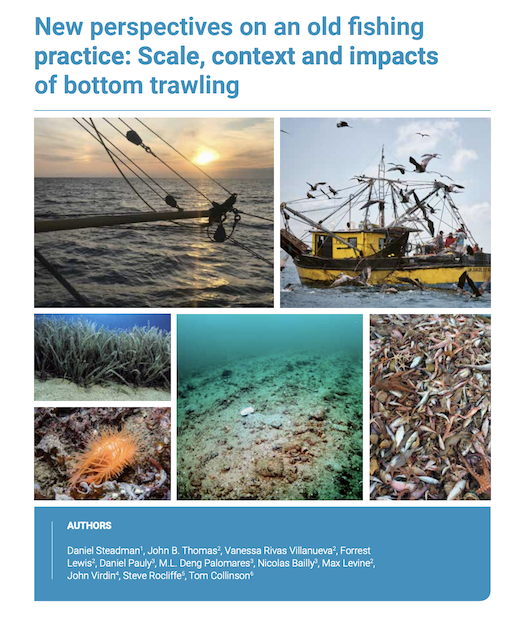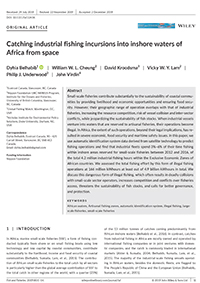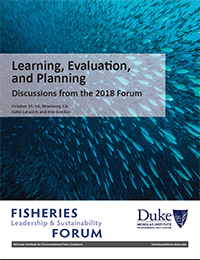Publications
A snapshot of the economic benefits from foreign bottom trawling in coastal West Africa: A mutually-beneficial trade in services, no winners or extractivism?
Large-scale fishing effort in the waters of tropical and lower income countries is predominantly driven by ‘distant water fishing fleets’ often owned by companies based in a small number of countries and has been associated with a range of negative environmental and social outcomes. West Africa is an example where such fleets are a dominant feature. In the waters of Guinea-Bissau, Guinea, Sierra Leone, Liberia and Ghana, 75% of all licensed bottom trawl vessels in 2017 either registered (‘flagged’) or largely owned in China.
Combatting Illegal Fishing through Transparency Initiatives: Lessons Learned from Comparative Analysis of Transparency Initiatives in Seafood, Apparel, Extractive, and Timber Supply Chains
Over the last two decades, efforts to combat illegal, unreported, and unregulated (IUU) fishing have led to an expansion of initiatives to enhance transparency across the seafood industry through international agreements, national government regulations, and voluntary private initiatives. Understanding of the effects of these initiatives remains limited, and approaches contested among stakeholders.
New Perspectives on an Old Fishing Practice: Scale, Context and Impacts of Bottom Trawling
A new report by leading fisheries experts found that over 99 percent of bottom trawling worldwide occurs inside the Exclusive Economic Zones of coastal nations—with much of the effort focused within just 12 miles of shore—posing risks to critical habitats and traditional, small-scale, artisanal fishing operations. As the only globally significant fishing practice that requires sustained contact with the seabed, bottom trawling has a uniquely high impact, one that can drive habitat destruction, coastal conflict and major fuel-related carbon emissions.
Blue Gold
This article in Samudra Report discusses a study that illustrates the deep influences guiding the gilded ocean economy: just 100 companies generated 60 percent of revenues from the largest ocean-based industries in 2018.
How Does the World Bank Shape Global Environmental Governance Agendas for Coasts? 50 Years of Small-Scale Fisheries Aid Reveals Paradigm Shifts Over Time
The contribution of marine small-scale fisheries to global food security and coastal livelihoods, coupled with the significant challenges they face, has attracted increasing attention and aid from environmental organizations, philanthropies, and multilateral agencies over recent decades. Our study attends to the understudied role of the World Bank, the largest individual funder shaping present and future sustainability of coastal marine regions, as a key actor shaping global environmental governance paradigms.
Recognize Fish as Food in Policy Discourse and Development Funding
The international development community is off-track from meeting targets for alleviating global malnutrition. Meanwhile, there is growing consensus across scientific disciplines that fish plays a crucial role in food and nutrition security. However, this ‘fish as food’ perspective has yet to translate into policy and development funding priorities.
Assessing the Potential for Transferability of Access Rights to Enhance Sustainability in Large Pacific Tropical Fisheries
This study was conducted in order to identify options for the transferability of fishing rights in the context of Pacific Island commercial longline and purse seine tuna fisheries. The motivation for conducting this study was to provide information that can assist policy makers and fisheries managers in the region to consider if this policy instrument (enhanced transferability of fishing rights) could support achievement of the goals agreed in the Regional Roadmap for Sustainable Pacific Fisheries.
Changing the Narrative on Fisheries Subsidies Reform: Enabling Transitions to Achieve SDG 14.6 and Beyond
The World Trade Organization is in the final stages of negotiating an agreement to prohibit harmful fisheries subsidies, thereby achieving UN Sustainable Development Goal 14.6. An effective agreement should be viewed as an opportunity for nations to proactively transition towards sustainable and equitable fisheries and pave the path for other SDGs.
Catching Industrial Fishing Incursions into Inshore Waters of Africa from Space
Small‐scale fisheries contribute substantially to the sustainability of coastal communities by providing livelihood and economic opportunities and ensuring food security. However, their geographic range of operation overlaps with that of industrial fisheries, increasing the resource competition, risk of vessel collision and inter‐sector conflicts, while jeopardizing the sustainability of fish stocks. When industrial vessels venture into waters that are reserved to artisanal fisheries, their operations become illegal.
Learning, Evaluation, and Planning: Discussions from the 2018 Forum
The 2018 Forum convened by the Fisheries Leadership & Sustainability Forum (Fisheries Forum) explored the role of learning, evaluation, and planning in the regional fishery management council process. In the increasingly complex federal fisheries management process, councils must use their finite resources strategically to achieve their goals and objectives. The Forum explored methods for instilling strategy into the council process through short-term planning, setting goals and objectives, evaluation, and long-term planning. Discussions also examined opportunities to build strategic capacity at the individual and institutional levels.










